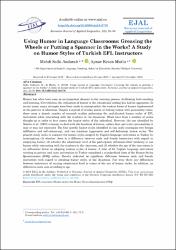| dc.contributor.author | Andarab, Mehdi Solhi | |
| dc.contributor.author | Kesen Mutlu, Aynur | |
| dc.date.accessioned | 2020-09-18T06:22:21Z | |
| dc.date.available | 2020-09-18T06:22:21Z | |
| dc.date.issued | 2019 | en_US |
| dc.identifier.citation | Andarab, M. S. ve Kesen Mutlu, A. (2019). Using humor in language classrooms: Greasing the wheels or putting a spanner in the works? A study on humor styles of Turkish EFL instructors. Eurasian Journal of Applied Linguistics, 5(1), 23-39. https://dx.doi.org/10.32601/ejal.543776 | en_US |
| dc.identifier.issn | 2149-1135 | |
| dc.identifier.uri | https://dx.doi.org/10.32601/ejal.543776 | |
| dc.identifier.uri | https://hdl.handle.net/20.500.12511/5856 | |
| dc.description.abstract | Humor has often been seen as an important element in the learning process, facilitating both teaching and learning. Nevertheless, the utilization of humor in the educational setting has had its opponents. In recent years, many attempts have been made to conceptualize the various forms of humor implemented in the practice of education. Despite a myriad of studies aimed at linking humor with personality traits, there seem a dearth number of research studies addressing the multifaceted humor styles of EFL instructors while interacting with the students in the classroom. There have been a number of scales thought-up in order to best assess the humor styles of the individual. However, the one identified by Martin et al. (2003) attempts to deal with the functions of humor, rather than particular personalities it may or may not represent. The four specific humor styles identified in this scale encompass two benign (affiliative and self-enhancing), and two injurious (aggressive and self-defeating) humor styles. The present study seeks to examine the humor styles adopted by English language instructors in Turkey by investigating (1) whether there is a difference between male and female instructors with regard to employing humor, (2) whether the educational level of the participants influences their tendency to use humor while interacting with the students in the classroom, and (3) whether the age of the instructors is an influential factor in adopting various styles of humor. A total of 64 English language instructors working at private and state universities in Turkey completed a standardized form of the Humor Styles Questionnaire (HSQ) online. Results indicated no significant difference between male and female instructors with regard to adopting humor styles in the classroom. Nor were there any differences between instructors of varying educational level in terms of the use of humor styles. In addition, no differences were seen according to age. | en_US |
| dc.language.iso | eng | en_US |
| dc.publisher | Hacettepe University | en_US |
| dc.rights | info:eu-repo/semantics/openAccess | en_US |
| dc.rights | Attribution-NonCommercial-NoDerivatives 4.0 International | * |
| dc.rights.uri | https://creativecommons.org/licenses/by-nc-nd/4.0/ | * |
| dc.subject | Language Classrooms | en_US |
| dc.subject | Turkish EFL Instructors | en_US |
| dc.subject | Humor Styles | en_US |
| dc.title | Using humor in language classrooms: Greasing the wheels or putting a spanner in the works? A study on humor styles of Turkish EFL instructors | en_US |
| dc.type | article | en_US |
| dc.relation.ispartof | Eurasian Journal of Applied Linguistics | en_US |
| dc.department | İstanbul Medipol Üniversitesi, Eğitim Fakültesi, Yabancı Diller Eğitimi | en_US |
| dc.authorid | 0000-0002-0355-9171 | en_US |
| dc.authorid | 0000-0001-7032-6338 | en_US |
| dc.identifier.volume | 5 | en_US |
| dc.identifier.issue | 1 | en_US |
| dc.identifier.startpage | 23 | en_US |
| dc.identifier.endpage | 39 | en_US |
| dc.relation.publicationcategory | Makale - Ulusal Hakemli Dergi - Kurum Öğretim Elemanı | en_US |
| dc.identifier.doi | 10.32601/ejal.543776 | en_US |
| dc.identifier.scopusquality | Q2 | en_US |



















